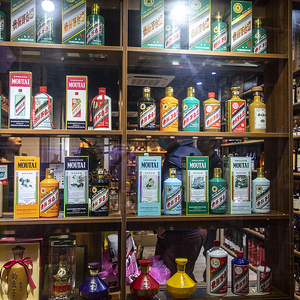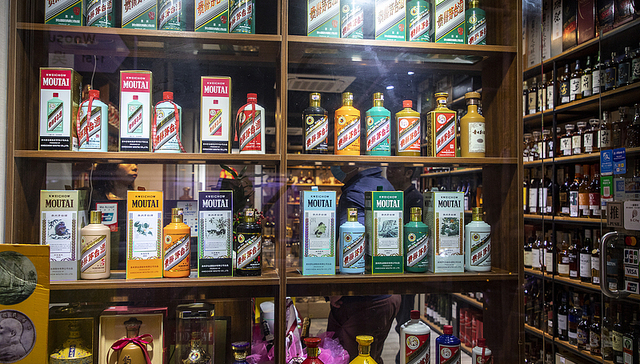by Wu Bingcong
Chinese baijiu brands are deepening their push into the Hong Kong market, tapping into the city’s nightlife and trade networks as they look beyond the mainland for new growth.
Moutai has opened a flagship store, Fenjiu has broken into Lan Kwai Fong, and advertising for Wuliangye and Luzhou Laojiao’s Guojiao 1573 now lights up Victoria Harbour. Once dominated by wine and whisky, the city’s spirits scene is beginning to take notice.
At a cocktail bar tucked in the alleys of Lan Kwai Fong, the weekend crowd now sips baijiu-based drinks featuring notes of chrysanthemum tea or Guizhou hot and sour soup. Some are priced at over HK$100 a glass. The bar is run by a mainland restaurateur, one of a growing number of entrepreneurs pushing baijiu into Hong Kong’s trendier corners.
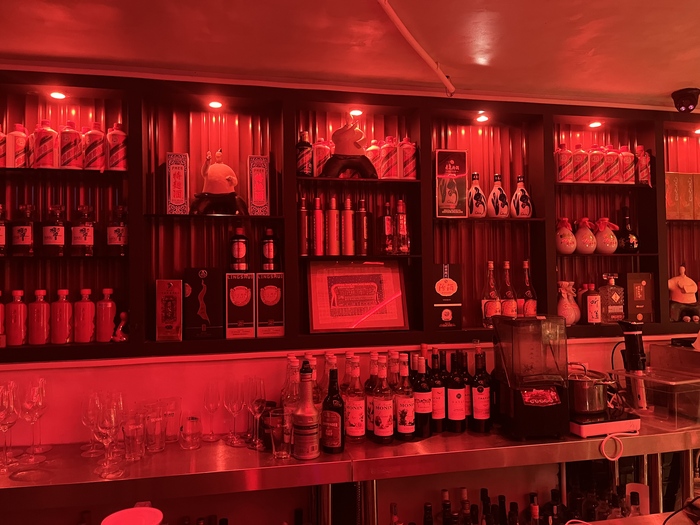
Photo by Wu Bingcong
The momentum follows a major policy shift. In December 2024, Hong Kong’s Legislative Council passed a tax reform bill slashing duties on imported spirits priced above HK0—from 100% to just 10% on the portion exceeding that threshold.
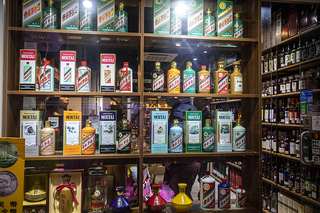
The move triggered a spike in high-end spirits imports. From October 2024 to March 2025, Hong Kong imported 11.28 million liters of spirits worth HK$3.18 billion, with mainland China accounting for more than half the value at HK$1.63 billion—surpassing even French brandy (HK$1 billion) and British whisky (HK$334 million), government data showed.
The duty cut brought immediate price relief at the top end, prompting Chinese liquor makers to step up promotions. Shanxi-based Fenjiu launched a rapid campaign to place its flagship Fenjiu 30yr Qinghua product in 10 bars across Lan Kwai Fong during the 2024 holiday season. A limited-time offer gave free shots to customers who followed its official overseas social media account.
While the giveaway ended after the Lunar New Year, participating bars continued stocking Fenjiu—and even developed new cocktails using a budget glass-bottled Fenjiu.
“Baijiu is still a tough sell overseas, so we need both brand building and channel development,” Yin Yue, head of Hong Kong and Macau operations at Xinghuacun Fenjiu, told Jiemian News.
Hong Kong’s liquor landscape remains crowded. In a supermarket at K11 Mall in Tsim Sha Tsui, over ten shelves are dedicated to imported wine, whisky and sake, while Chinese baijiu occupies just a few.
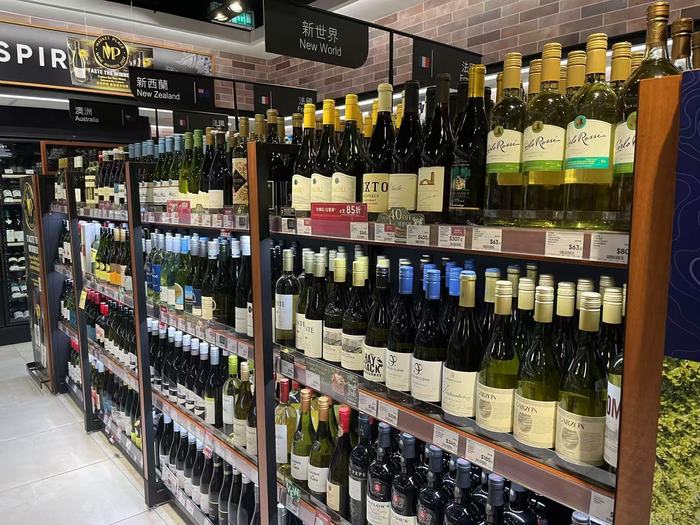
Photo by Wu Bingcong
Retail channels have proven challenging. “Supermarkets want high markups and require minimum sales thresholds,” Yin said. “If the product doesn’t move, it gets delisted.”
Instead, baijiu makers are turning to tastings and social events to cultivate interest. Fenjiu now avoids relying on retail chains, preferring direct engagement—often through charismatic distributors.
One distributor nicknamed “Er Ge” has become something of a legend. During a business dinner, he took the Fenjiu team to a Victoria Harbour bar and began pouring free samples for patrons, gathering over 20 new WeChat contacts in a single evening, according to Yin. Fluent in Mandarin, Cantonese, English and other languages, he exemplifies the kind of ground-level network local partners must offer.
The push is attracting multiple mainland brands. In a shopping center near Hung Hom MTR station, Moutai, Wuliangye, Luzhou Laojiao and Guizhou Xijiu each have branded stores—operated by local distributor Everrise International. At Luzhou Laojiao’s boutique, tasting sessions are hosted regularly for corporate clients, with free drinks and no venue fee.
Andy, a host at the Luzhou Laojiao store, said mainland banks and insurers have begun using the space for team or client events. These events sometimes feature multiple brands. Though baijiu makers are rivals, the same distributor may carry several product lines, occasionally presenting them side-by-side for comparative tastings.

Photo by Wu Bingcong
“We usually don’t mix competing products in the same tasting—but sometimes, customers request comparisons.”
Luzhou Laojiao International Development set up its Hong Kong arm in 2012. A company representative said that since 2023, it has prioritized the Hong Kong and Singapore markets, optimizing local distributor networks to increase market share.
Despite the rising presence, foot traffic at Hong Kong’s baijiu stores remains light. For now, liquor companies and distributors are investing heavily to gain visibility—returns may take time.
Baijiu still faces a culture gap. “Light tipsiness is preferred here. People don’t aim to get drunk,” said Emily, a mainland-born bank employee who has lived in Hong Kong for seven years.
She believes baijiu’s inroads would be much harder without the presence of Chinese state-owned firms. Data backs her up. By end-2024, 1,478 mainland companies were listed on the Hong Kong Stock Exchange, accounting for over 80% of total market cap and nearly 90% of trading volume. These firms, and the jobs they bring, also create a built-in consumer base for baijiu.
“In Hong Kong, building the market depends heavily on support from mainland institutions,” Yin said. “They know baijiu already—and their influence is better than a billboard.”
Even as the domestic market cools, Chinese baijiu makers are looking outward. In March, delegates from liquor firms attending the national legislature called for accelerating internationalization.
The numbers explain why. According to 2024 earnings, Moutai’s growth slowed from 18.04% in 2023 to 15.66%, Wuliangye’s from 12.58% to 7.09%, and Luzhou Laojiao’s from 20.34% to just 3.19%. For the first time since 2017, Moutai cut its annual revenue growth target—down to 9%.
Still, overseas markets offered bright spots. Moutai posted record overseas revenue of 5.19 billion yuan in 2024, up 19.27% year-on-year, with export volume rising 6.17%. Fenjiu’s shipments to the Hong Kong market surged nearly 69% in the same period.
For now, Hong Kong remains a strategic springboard. Though not the largest market, it offers speed, visibility, and access to regional and global networks.
“This may take off quickly, or it may take years,” Yin said. “But either way, it’s a flag we have to plant.”
